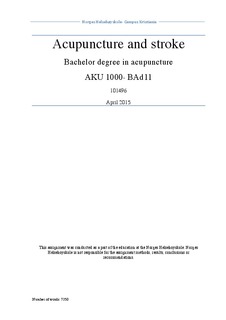Acupuncture and stroke
Bachelor thesis
Permanent lenke
http://hdl.handle.net/11250/2386244Utgivelsesdato
2016-04-19Metadata
Vis full innførselSamlinger
Sammendrag
Background: 15000 Norwegians are affected by stroke each year, with the direct cost estimated to be 7-8 billion kroner yearly (1). Stroke is prevalent mainly in the elderly, and with an increasing number of elderly people in society the number of stroke patients will also increase (1)(2)(3, p286). As a professional nurse the author has encountered numerous stroke patients with varying degrees of quality of life hindering patient physical recovery and was therefore interested to what degree acupuncture can improve the quality of life for stroke patients. Symptoms of reduced quality of life can hinder the patient’s rehabilitation process (4) Topic sentence: To what degree can acupuncture improve the quality of life for stroke patients? Method: The assignment is a literature study based on results from research articles and Traditional Chinese Medicine (TCM) and Western Medicine (WM) theory of stroke. The assignment is based on acupuncture and therefore the TCM theory is emphasized. Results: NHP 1 improved significantly for patients receiving acupuncture 3-4 times a week from baseline to 6 weeks and 12 months (5, 6), when the treatment was based on syndrome differentiation. NHP 2 also improved at 12 months. NHP 1 improved after treatment twice a week for 10 weeks from baseline to 3, 6 and 12 months, when it was based on TCM theory (7). Results showed no significant improvement between the acupuncture group and control group when acupuncture treatment was standardized (8, 9) Conclusion: Acupuncture can, to a high degree, improve the quality of life for post stroke patients when the acupuncture treatment is based on TCM theory. All articles included in the assignment are over 10 years old, and it is noted that newer, more detailed research is required.

